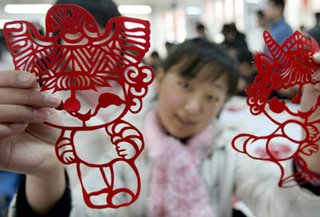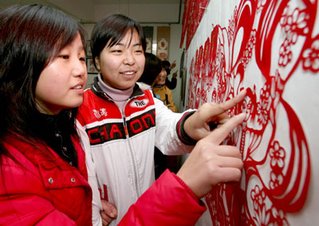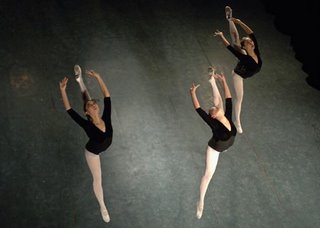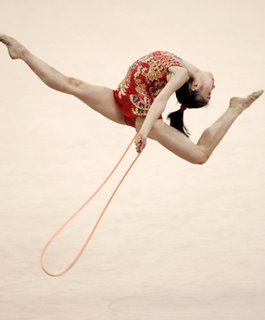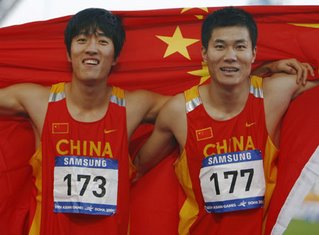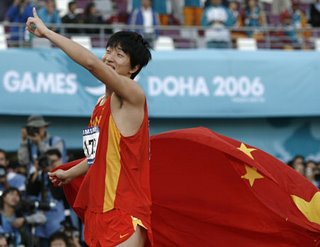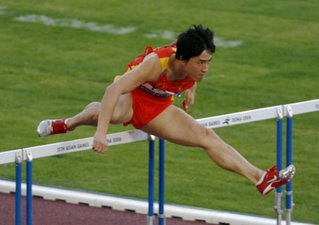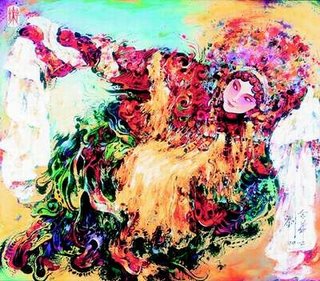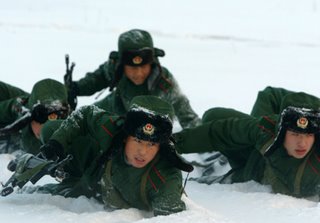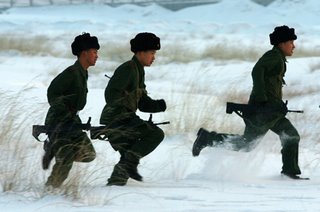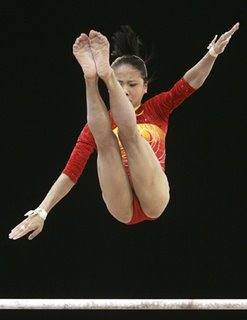China Report
Tell China to world
Monday, December 25, 2006
Chinese Paper Cuts in celebration of the imminent New Year
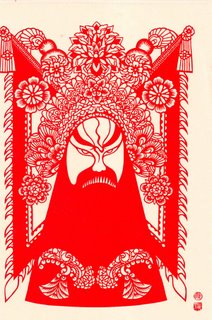
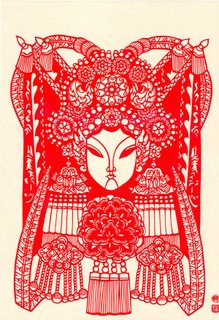
Chinese Paper Cuts also called Scissor-cuts, it is a kind of folk artwork with rich local flavor popularizing in numerous people. Chinese Paper cuts was come out during the period of Nanbeichao Dynasty.Colorful paper cut by scissors is often used as decoration and forms various artistic styles because of different purposes, such as for window decoration, basket decoration, present decoration and designs. Among them paper-cut for window decoration is the most popular. So paper-cut is also called Window Grille. Basket decoration is hanging decoration for festivals. Present decoration is to add color for the present and exaggerate living atmosphere and encourage the people's emotions.Paper-cut designs are to design the models for folk needlework. Most of them are red and some are colorful. Folk scissor-cut is gentle, lovely and vivid with bright color. Cut skills are powerful and smooth. The line is easy. Its subject often comes from the folk and is good decoration.
Sunday, December 24, 2006
Christmas Celebrations in China and Hong Kong
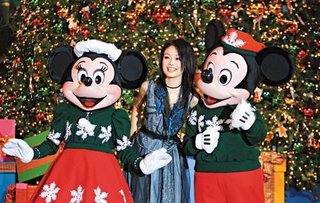
Christmas Celebrations in China and Hong Kong
While Christmas Day is not a public holiday, Christmas celebrations are becoming more popular in China itself. Particularly in urban areas, you'll find Christmas trees, lights, and other decorations on the streets and in department stores. Children hang up muslin stockings in the hope that Dun Che Lao Ren, the Chinese version of Santa Claus, will visit and leave gifts. Attendance at Christmas Eve mass has also become more popular in recent years. (A similar trend can be found in Japan, where store owners have discovered the commercial potential of celebrating the Yuletide season.
Ta Chiu, a Taoist festival,takes place on December 27th in Hong Kong. One of the more interesting traditions of this festival comes near the end, when the priests read the names of everyone who lives in the area. When the priest has finished reading the list, the names are attached to a paper horse and burned, the hope being that they will rise to heaven.
Read on to learn more about Christmas celebrations in Asia and try some festive recipes:
Chinese Christmas Celebrations
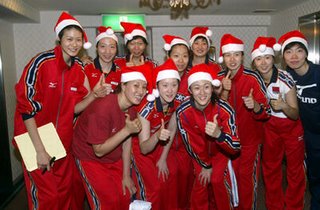
Christmas: Less Important Than Chinese New Year, But Still Sometimes Celebrated
Chinese New Year is the foremost winter holiday in Chinese culture. Still, that doesn't mean that Christmas is ignored altogether. My friend Judy and her family are a good example. She is a first-generation Canadian, as her Chinese parents emigrated from Hong Kong in the 1950's. When the children were small, her parents put up an artificial Christmas tree each year. Presents were exchanged on Christmas morning - unfortunately, she missed out on having a Christmas stocking, since her parents were unfamiliar with that particular custom!
Food and Family
As in western culture, Christmas day was a time to spend with family. Judy recalls sitting down with relatives to a large meal on Christmas day, but it could be served at either lunch or dinner. Instead of turkey, her father would prepare foods such as roast barbecued pork, chicken, and soup with wood ears. Reminiscing, she says the meal had more in common with a Chinese New Year's banquet than a traditional Christmas dinner.
Now that there are no children in the house, the artificial tree has been relegated to the garage, and the family often skips the large meal, although everyone still exchanges gifts. Chinese New Year has returned to being the major winter holiday.
Wednesday, December 20, 2006
Buddhism


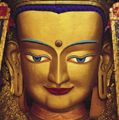

After the fall of the Western Chin, the Chinese withdrew South to Nanking and established the Eastern Chin dynasty, which was succeeded by a series of weak governments. The conquered North was occupied and divided between various sinicized peoples, who soon were warring with one another. Hence began the 'North and South Dynasties' period (317-581), which resembles the fuedal periods in Europe and Japan. In the South, the upper classes who devoted their lives to academics and literature began to explore Buddhism, often discovering it through Neo-Taoism. At the same time, Buddhism was adopted and promoted by many of the occupying dynasties in the North, where it eventually would achieve a popularity nearing the status of a state religion. Kumarajiva arrived and established the first Imperial translation bureau in the North, while a well read sangha in the South studiously examined the scriptures and developed the first beginnings of a Chinese Buddhism theology. This period closes with the reunification of China under the Sui dynasty.
Tuesday, December 19, 2006
Report: China currency not manipulated
Washington - The Bush administration said Tuesday that China does not meet the technical requirements of a country that is manipulating its currency to gain unfair trade advantages.
The administration did say Tuesday that "more flexibility in China's exchange rate will help it achieve more balanced growth" and promote a number of other outcomes that would be economically beneficial.
But in the report it is required to deliver to the US Congress every six months, the administration said that no country met the "technical requirements for designation" as a currency manipulator.
Such a designation could trigger negotiations that could ultimately lead to trade sanctions.
The new report was released four days after a US Cabinet delegation led by Treasury Secretary Henry Paulson concluded high-level talks in Beijing aimed at resolving the root causes of America's growing trade deficit with China.
The report did not please China's harshest critics in US Congress, such as Sens. Chuck Schumer and Lindsey Graham.
Schumer and Graham were the lead sponsors of legislation last year that would have imposed 27.5 percent penalty tariffs on all Chinese imports if China did not "move more quickly" to allow its currency to rise in value against the dollar.
The administration opposed the legislation on the grounds that it would raise the price of Chinese imports to American consumers.
Sen. Max Baucus said he believed the requirement for a report every six months had outlived its usefulness and he planned to pursue legislation that would mandate a different approach in the new Congress.
Baucus, who next year will head the Senate Finance Committee of the United States, which has jurisdiction over trade, has proposed legislation that would offer milder sanctions against countries with "misaligned" currencies.
America's trade deficit with China is expected to easily surpass last year's $202 billion.
The Bush administration is under heavy political pressure to do something about America's record trade deficits.
Paulson did not comment on the new report, which was delivered to the US Congress two months late.
"China's economy needs a more balanced pattern of growth that is more consumption-based with a flexible exchange rate regime and a modernized financial sector," the new report stated.
The report also cited the goals of the newly launched "Strategic Economic Dialogue," which is designed to be a two-year effort to resolve some of the most contentious economic issues between the two countries through twice-a-year high-level meetings.
The report said the goals of the dialogue were to help China achieve balanced growth without large trade imbalances by pursuing exchange rate flexibility, protection of intellectual property rights, boosting domestic consumption and opening up China's service sector to participation by US and other foreign firms.
"China's currency policy is a core issue in the China-United States economic relationship," the currency report stated.
If the administration had deemed China a currency manipulator, that would have triggered talks between the two countries. China also might have faced trade sanctions -- but first the United States would have had to win a case on the issue before the World Trade Organization.
American manufacturers contend China undervalues its currency against the dollar, which makes Chinese goods cheaper for American consumers and American goods more expensive in China.
The administration did say Tuesday that "more flexibility in China's exchange rate will help it achieve more balanced growth" and promote a number of other outcomes that would be economically beneficial.
But in the report it is required to deliver to the US Congress every six months, the administration said that no country met the "technical requirements for designation" as a currency manipulator.
Such a designation could trigger negotiations that could ultimately lead to trade sanctions.
The new report was released four days after a US Cabinet delegation led by Treasury Secretary Henry Paulson concluded high-level talks in Beijing aimed at resolving the root causes of America's growing trade deficit with China.
The report did not please China's harshest critics in US Congress, such as Sens. Chuck Schumer and Lindsey Graham.
Schumer and Graham were the lead sponsors of legislation last year that would have imposed 27.5 percent penalty tariffs on all Chinese imports if China did not "move more quickly" to allow its currency to rise in value against the dollar.
The administration opposed the legislation on the grounds that it would raise the price of Chinese imports to American consumers.
Sen. Max Baucus said he believed the requirement for a report every six months had outlived its usefulness and he planned to pursue legislation that would mandate a different approach in the new Congress.
Baucus, who next year will head the Senate Finance Committee of the United States, which has jurisdiction over trade, has proposed legislation that would offer milder sanctions against countries with "misaligned" currencies.
America's trade deficit with China is expected to easily surpass last year's $202 billion.
The Bush administration is under heavy political pressure to do something about America's record trade deficits.
Paulson did not comment on the new report, which was delivered to the US Congress two months late.
"China's economy needs a more balanced pattern of growth that is more consumption-based with a flexible exchange rate regime and a modernized financial sector," the new report stated.
The report also cited the goals of the newly launched "Strategic Economic Dialogue," which is designed to be a two-year effort to resolve some of the most contentious economic issues between the two countries through twice-a-year high-level meetings.
The report said the goals of the dialogue were to help China achieve balanced growth without large trade imbalances by pursuing exchange rate flexibility, protection of intellectual property rights, boosting domestic consumption and opening up China's service sector to participation by US and other foreign firms.
"China's currency policy is a core issue in the China-United States economic relationship," the currency report stated.
If the administration had deemed China a currency manipulator, that would have triggered talks between the two countries. China also might have faced trade sanctions -- but first the United States would have had to win a case on the issue before the World Trade Organization.
American manufacturers contend China undervalues its currency against the dollar, which makes Chinese goods cheaper for American consumers and American goods more expensive in China.
Thursday, December 14, 2006
Tuesday, December 12, 2006
Monday, December 11, 2006
China Launches Association for SMEs
China set up an association for small and medium-sized enterprises (SMEs) on Monday to promote their development. Vice Premier Zeng Peiyan said at the inauguration ceremony that the number of SMEs had risen rapidly in recent years and that SMEs had played an important role in boosting economic growth and employment. He urged the SMEs to pay more attention to environmental protection and social responsibility. Enterprises should be guided towards labor-intensive industry, modern service industry, equipment manufacturing and hi-tech industry, said Zeng.
He also called for the market entry rules for SMEs to be relaxed. "The association should serve as a link between SMEs and the government and help SMEs solve problems in their development," said the vice premier.
Statistics with the National Development and Reform Commission show that 99.6 percent of Chinese companies are SMEs, which contribute 58 percent to the country's GDP.
He also called for the market entry rules for SMEs to be relaxed. "The association should serve as a link between SMEs and the government and help SMEs solve problems in their development," said the vice premier.
Statistics with the National Development and Reform Commission show that 99.6 percent of Chinese companies are SMEs, which contribute 58 percent to the country's GDP.
Thursday, December 07, 2006
Wednesday, December 06, 2006
China terminates Japan's 20-year domination in Asiad judo
Chinese judo team topped the gold medal list for the first time at any Asian Games here in Doha, but players and coaches expressed cautions on Tuesday.
China snatched five gold medals and three bronze medals, surpassing Japanese team which grabbed 4 gold medals.
China "dethroned Japan from their 20-year domination of Asian Games judo" Japan's Kyodo News reported.
Japan, the birthplace the judo, has dominated judo contests in Asia for a long time and grabbed a record eight gold medals in 2004.
Though excited over the super performance by Chinese judo players, Chinese coaches and officials remained calm and expressed cautions.
"The players perform well in the contests, but there are still obvious lapse and lot of room to improve," said Xiong Fengshan, China's deputy team manager.
Xiong's view was echoed by Chinese coach Fu Guoyi.
"Though women's judo competition at the Asian Games is at world level, but the true test will be the Olympic Games," said Fu.
He added that the results at the Doha Asian judo contests can not fully demonstrate the true strength of the two teams.
Chinese sports official Song Zhaonian also said that judo players can not be carried away by the results.
Meanwhile, Japanese men's coach Hitoshi Saito criticized his players.
"We could not take advantage of what we had learned at the world team championships. We lacked the persistence to win," he said.
"I acknowledge the disgrace but come home with my head up high. I must say this is not the end, " he added.
China snatched five gold medals and three bronze medals, surpassing Japanese team which grabbed 4 gold medals.
China "dethroned Japan from their 20-year domination of Asian Games judo" Japan's Kyodo News reported.
Japan, the birthplace the judo, has dominated judo contests in Asia for a long time and grabbed a record eight gold medals in 2004.
Though excited over the super performance by Chinese judo players, Chinese coaches and officials remained calm and expressed cautions.
"The players perform well in the contests, but there are still obvious lapse and lot of room to improve," said Xiong Fengshan, China's deputy team manager.
Xiong's view was echoed by Chinese coach Fu Guoyi.
"Though women's judo competition at the Asian Games is at world level, but the true test will be the Olympic Games," said Fu.
He added that the results at the Doha Asian judo contests can not fully demonstrate the true strength of the two teams.
Chinese sports official Song Zhaonian also said that judo players can not be carried away by the results.
Meanwhile, Japanese men's coach Hitoshi Saito criticized his players.
"We could not take advantage of what we had learned at the world team championships. We lacked the persistence to win," he said.
"I acknowledge the disgrace but come home with my head up high. I must say this is not the end, " he added.
Tuesday, December 05, 2006
2006 a year of 'harvest' in China's diplomacy
The year 2006 is a year of "harvest" in China's diplomacy, during which China has made all-round headway in developing relations with world powers, neighboring countries, developing countries and in its multilateral diplomacy, a senior Chinese diplomat said here Tuesday.
Wu Jianmin, president of the Foreign Affairs College and former Chinese Ambassador to France, made the remarks when commenting on China's diplomacy in 2006.
"We have seen progress this year in relations between China and major world powers including the United States, Japan and Russia," Wu said.
The development of China-U.S. relations is a shining point and the upcoming bilateral economic strategic dialogue is the first of its kind to promote economy, Wu said.
On Taiwan issue, the United States have sent clear signals of warning whenever the Taiwan secessionists appeared to make troubles this year, Wu said.
"This shows that it is a consensus to maintain stability across Taiwan straits," he added.
Japan's new Prime Minister Shinzo Abe's visit to China marked a turning point in bilateral ties and ended a five-year political stalemate between the two countries, Wu said.
Major events in China's diplomacy with neighboring countries include the Shanghai Cooperation Organization summit and the China-ASEAN commemorative summit.
Wu said the success of these two summits has demonstrated the important progress in China's relations with its neighboring countries.
The China-Africa summit has aroused world attention which marks a new phase in the development of China-Africa relations, he noted.
Multilateral diplomacy is a platform for enhancing a harmonious world, he said. As an outcome of China's multilateral diplomacy, Margaret Chan from China has been elected as World Health Organization chief, he added.
Chinese President Hu Jintao has put forward a concept of "harmonious world" in UN Assembly in 2005.
Guding by this concept, China's diplomacy has scored a harvest and stepped onto a new stage in 2006, Wu said.
Wu Jianmin, president of the Foreign Affairs College and former Chinese Ambassador to France, made the remarks when commenting on China's diplomacy in 2006.
"We have seen progress this year in relations between China and major world powers including the United States, Japan and Russia," Wu said.
The development of China-U.S. relations is a shining point and the upcoming bilateral economic strategic dialogue is the first of its kind to promote economy, Wu said.
On Taiwan issue, the United States have sent clear signals of warning whenever the Taiwan secessionists appeared to make troubles this year, Wu said.
"This shows that it is a consensus to maintain stability across Taiwan straits," he added.
Japan's new Prime Minister Shinzo Abe's visit to China marked a turning point in bilateral ties and ended a five-year political stalemate between the two countries, Wu said.
Major events in China's diplomacy with neighboring countries include the Shanghai Cooperation Organization summit and the China-ASEAN commemorative summit.
Wu said the success of these two summits has demonstrated the important progress in China's relations with its neighboring countries.
The China-Africa summit has aroused world attention which marks a new phase in the development of China-Africa relations, he noted.
Multilateral diplomacy is a platform for enhancing a harmonious world, he said. As an outcome of China's multilateral diplomacy, Margaret Chan from China has been elected as World Health Organization chief, he added.
Chinese President Hu Jintao has put forward a concept of "harmonious world" in UN Assembly in 2005.
Guding by this concept, China's diplomacy has scored a harvest and stepped onto a new stage in 2006, Wu said.
Sunday, December 03, 2006
Chinese swimmers leave Japanese rivals in slipstream
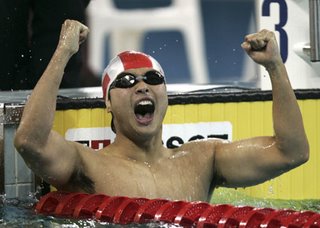
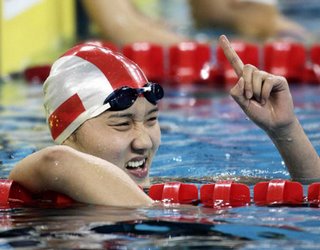
DOHA - Pang Jiaying won the first of China's five swimming gold medals at the 15th Asian Games on Saturday with an emphatic victory in the women's 200m freestyle.
Pang broke clear of the field with 50m remaining to win in a time of 1:59.26, beating team mate and defending champion Yang Yu into second place with Japan¡¯s Maki Mita taking the bronze.
A relay silver medallist at the Athens Olympics, Pang said the one-two punch showed Chinese swimmers were working towards success together, rather than as individuals.
"I'm very excited about this gold medal and very satisfied by my performance," Pang said.
"We always encourage each other and have common goals. Whoever wins we are satisfied. It is China who will be the winner," she said, adding that she was confident of winning gold in Beijing in 2008.
China boosted its mushrooming medal tally with four more golds in the pool through Wu Peng in the men¡¯s 200m butterfly, Zhou Yafei in the women¡¯s 100m butterfly, Ji Liping in the women's 50m breaststroke and the women¡¯s 4x100m medley relay.
Wu allowed Japanese pair Takeshi Matsuda and Ryuichi Shibata¡ªthe world number four and five¡ªto do the early work before storming past them in the final 25m to win in a time of 1:54.91.
"Four years ago, I wouldn¡¯t have expected this, but this time I was expecting to win," said Wu.
"As I came down the last length, I knew it was time for the final battle. I knew about Shibata. He has more speed than me, but my focus was my speed at the end."
Sano Hidemasa got Japan off the mark in the men's 400m individual medley, opening up an unassailable lead from the gun to finish ahead of compatriot Shinya Taniguchi in 4:16.18.
Hidemasa piled on the pressure during his strong butterfly and backstroke legs and hung on for the only non-Chinese victory of the night.
"I'm very happy to win, because I know China and Japan are challenging each other," he said.
"I played to my strengths successfully and this gold medal will help to advance our medals tally."
South Korea¡¯s Han Kyu-chul took the bronze.
China shows expected dominance at Asian Games
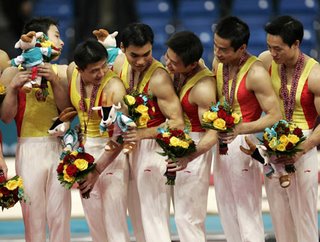
Day 1: China shows expected dominance at Asian Games(Xinhua)Updated: 2006-12-03 09:08
DOHA - Everyone knew China would dominate the Doha Asian Games, but few knew they could do in such an extreme way.
They swept 16 out of 20 gold medals on offer on the first day's official competition on Saturday, getting off to flying start towards its seventh consecutive feat of topping the medal tally since 1982.
Chinese gymnastics men's group gold winners (from left to right) Zou Kai, Chen Yibing, Liang Fuliang, Feng Jing, Xiao Qin and Yang Wei stand on the podium during their victory ceremony at the 15 Asian Games Doha 2006 December 3, 2006. The men's team won their 9th straight gold at Asian Games. [Xinhua]
Japan took three golds, including two from their traditional territory of judo and one from the swimming pool. Judokas Sae Nakazawa won the women's 78kg class while Muneta clinched men's over 100kg title.
Their other gold medal was from swimmer Sano Hidemasa in the men's 400m individual medley.
South Korea, fighting for the second place against Japan at the Games, managed only one from Jang Sung Ho, who claimed the men's 100kg judo title.
China claimed its first gold medal in the men's 10m air rifle team event early Saturday morning. Olympic champion Zhu Qinan, Li Jie and Liu Tianyou beat South Korea with 1,786 points to win the Games' first gold.
"It's a great start for the Chinese delegation," said Duan Shijie, deputy chef de mission of the Chinese delegation. "This gold is a perfect morale-boost for our fellow Chinese athletes to compete in this Games."
Little-known Liu Tianyou emerged as the hero of the defending Asian Games champions as the 24-year-old scored the highest 598 points.
Three Chinese shooters became double winners as China went on to clean-sweep all the day's six shooting gold medals.
Liu won his second in the men's 10m air rifle by collecting 700.8 points.
China's trap team, including Chen Li, Wang Yujin and Zhu Mei, beat DPR Korea to clinch the trap team event. Chen then added the women's trap gold to her team title.
Olympic champion Du Li grabbed the women's 10m air rifle individual gold before leading the Chinese trio, also consisting of Zhao Yinghui and Wu Liuxi, to win the women's rifle team title.
China's sweetest title came from the men's gymnastics team event. They overcame a 1.500-point deficit before the last rotation to beat Olympic champions Japan with 377.100 points, extending their men's team dominance for the ninth successive time at the Asian Games history.
Japan scored 4.050 points to finish second and South Korea totalled 371.500 to settle for the third. South Korean Yang Tae Young suffered a foot injury over landing of high bar, but he struggled to take the pommel horse and earned his team a bronze.
China took away all three weightlifting gold medals in the women's 48kg, 53rd classes and men's 56kg category. They also ruled the swimming pool, seizing five out of six gold medals to leave the remaining one to Japan.
World bronze medalist Wu Peng struck a brilliant victory to retain the men's 200m butterfly title under the pressure of two strong Japanese rivals.
Zhou Yafei and Pang Jiaying each had two gold medals to their names when defending champion Zhou won the women's 100m butterfly in 58.39 after Pang beat defending champion and teammate Yang Yu for the women's 200m freestyle gold in 1:59.26.
In the last event later Saturday night, the two rallied with Luo Nan (breaststroke) and Zhao Jing (backstroke) to bring in another gold for China in the 4x100m medley relay.
Asian champion Ji Liping of China took the first ever 50m breaststroke gold and set the Games record in 31.52. The 50m breaststroke was added to the Asian Games program for the first time.
In judo action, Tong Wen was the only Chinese winner, beating Tserenkhand Dorjgotov of Mongolia with ippon to take the women's over 78kg title.
A total of 28 gold medals will be decided on the second day's competition on Sunday.




